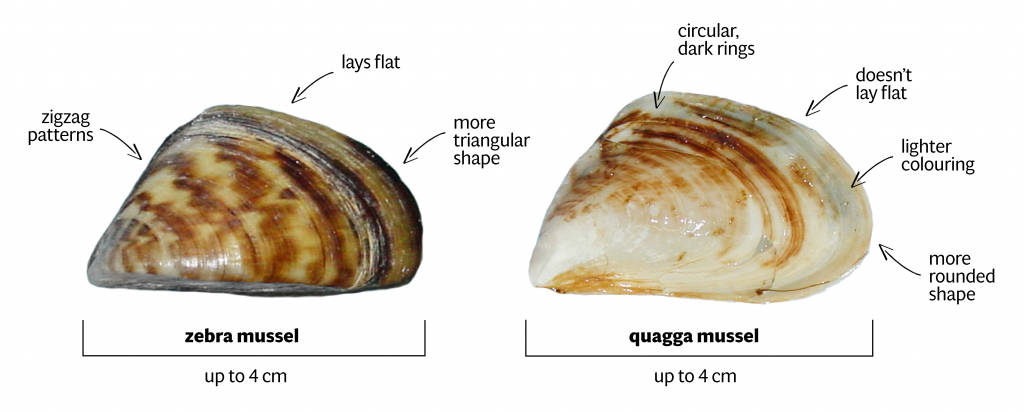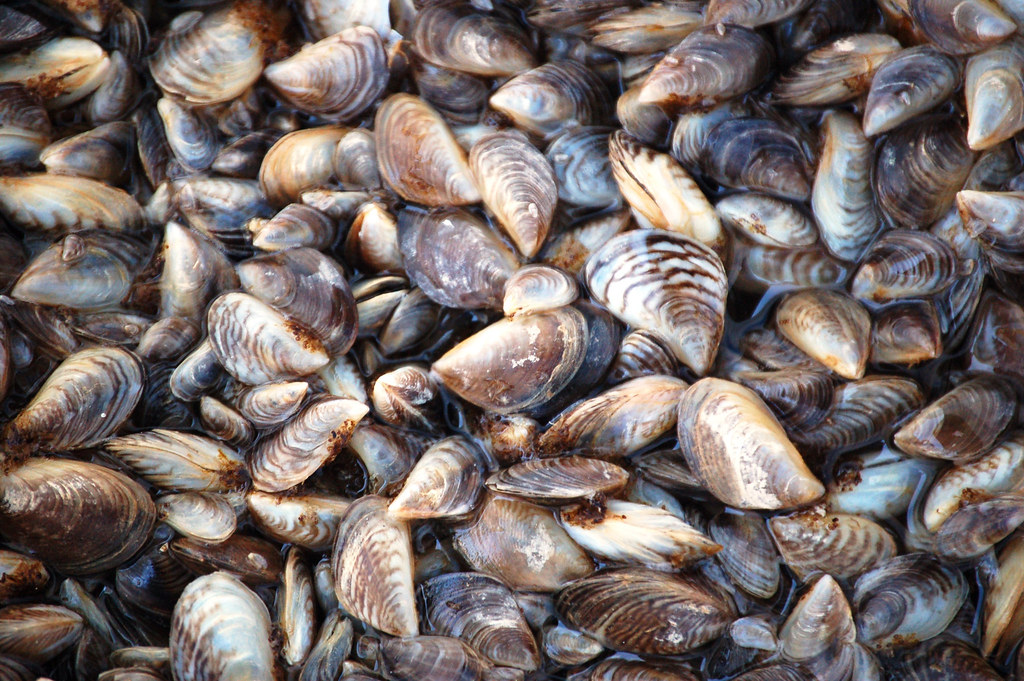No, you should not eat zebra mussels. They are invasive and can accumulate toxins.
Zebra mussels are small, freshwater bivalves that have become a significant invasive species in many parts of the world. Originating from Eastern Europe, they have spread to various water bodies, causing environmental and economic issues. These mussels are known for their rapid reproduction and ability to clog water intake pipes, disrupt ecosystems, and damage infrastructure.
Consuming zebra mussels poses health risks due to their potential to accumulate toxins and contaminants from the water. They can also affect native species by outcompeting them for resources. Understanding the impact of zebra mussels is essential for managing and mitigating their spread.
Credit: www.star-telegram.com
The Zebra Mussel Conundrum
The zebra mussel is a small but mighty invader. Found in many freshwater lakes and rivers, this creature poses a big question: Can you eat zebra mussels? Before answering, let’s dive into why these mussels are so controversial.
Invasive Species Alert
Zebra mussels are an invasive species. They originate from Eastern Europe and have spread across North America. They hitch rides on boats and spread quickly. Their rapid spread has caused many problems for native ecosystems.
Here are some quick facts about zebra mussels:
- They are small, usually about the size of a fingernail.
- They have a striped shell, which is where they get their name.
- They attach to hard surfaces, including boats and water pipes.
The Zebra Mussel’s Ecosystem Impact
Zebra mussels can have a huge impact on their new environments. They filter water, which may sound good, but it actually harms native species.
Let’s look at some of the ecosystem impacts:
| Impact | Description |
|---|---|
| Water Clarity | Zebra mussels filter out plankton, making water clearer. |
| Native Species | They compete with native species for food and habitat. |
| Infrastructure | They clog water pipes and damage boats. |
Zebra mussels may seem harmless due to their size. Yet, their impact on ecosystems and infrastructure is undeniable.

Credit: lakes.grace.edu
Toxicity And Health Concerns
Zebra mussels are small freshwater mollusks. They can be harmful if eaten. Understanding their toxicity is important for health.
Bioaccumulation Of Toxins
Zebra mussels filter water for food. They can accumulate toxins from the water. Heavy metals and pollutants can build up in their bodies. This process is called bioaccumulation. Eating zebra mussels can expose you to these toxins.
Potential Health Risks
Consuming zebra mussels can lead to health issues. The toxins they accumulate are harmful. Some potential health risks include:
- Nausea and vomiting
- Diarrhea
- Neurological issues
- Organ damage over time
It is important to avoid eating zebra mussels. Their ability to accumulate toxins makes them unsafe. Always check the safety of any wild-caught seafood.
Culinary Ventures
Exploring the culinary potential of zebra mussels is a fascinating journey. This section delves into both historical and modern culinary uses of these unique shellfish.
Historical Consumption
Historically, zebra mussels were not considered food. These small, freshwater mussels were seen as pests. They invaded water systems and caused problems. There is little evidence of ancient cultures consuming zebra mussels. They were more interested in larger, marine mussels. These provided more meat and were easier to harvest.
Modern Culinary Experiments
Today, chefs and food enthusiasts are curious about zebra mussels. Some modern chefs experiment with these mussels. They use them in creative dishes. Here are some ways zebra mussels are being used:
- Zebra mussel soup: A rich, flavorful broth using zebra mussels.
- Grilled zebra mussels: Lightly grilled and seasoned with herbs.
- Fried zebra mussels: Breaded and fried for a crispy snack.
Chefs focus on sustainability and environmental impact. Zebra mussels are invasive. Using them in cooking helps control their population. This makes for an eco-friendly culinary choice.
| Dish | Preparation |
|---|---|
| Zebra Mussel Soup | Boil mussels with vegetables and spices. |
| Grilled Zebra Mussels | Grill mussels with olive oil and herbs. |
| Fried Zebra Mussels | Bread and fry until golden brown. |
Trying zebra mussels can be an adventure. They offer a new taste and help the environment. Are you ready for a culinary adventure?
Legal And Environmental Considerations
Considering the consumption of zebra mussels involves understanding both legal and environmental aspects. These aspects are crucial for responsible and informed decisions. Below are the key elements you need to know under the ‘Legal and Environmental Considerations’.
Regulatory Stance On Consumption
Before consuming zebra mussels, check the regulations in your region. Many countries and states have specific rules. These rules often prohibit the harvesting of zebra mussels. Authorities classify zebra mussels as an invasive species. This means they can cause harm to local ecosystems. Consuming them may not be illegal, but harvesting them can be.
Regulatory bodies like the U.S. Fish and Wildlife Service provide guidelines. They monitor and control the spread of zebra mussels. Always consult local regulations before considering zebra mussels as food.
Environmental Implications Of Harvesting
Harvesting zebra mussels can have significant environmental impacts. As an invasive species, they disrupt local ecosystems. Removing them could help restore balance. But, improper harvesting can cause more harm.
- Biodiversity Loss: Zebra mussels compete with native species.
- Water Quality: They filter water, which can reduce food for other species.
- Habitat Disruption: Removing large quantities can damage habitats.
Responsible harvesting methods are crucial. Always follow guidelines set by environmental authorities. This ensures that your actions do not harm the ecosystem further.
Here is a brief table summarizing the legal and environmental considerations:
| Aspect | Details |
|---|---|
| Regulatory Stance | Check local laws and guidelines. |
| Environmental Impact | Follow responsible harvesting methods. |
Safe Consumption Practices
Zebra mussels have become a topic of interest for many. Their spread across waters has raised questions about their safety for consumption. Understanding safe practices is crucial.
Preparing Zebra Mussels Safely
Proper preparation is essential to ensure zebra mussels are safe to eat. Follow these steps:
- Collect from Clean Waters: Always gather zebra mussels from unpolluted waters.
- Thorough Cleaning: Rinse mussels under clean water to remove debris and contaminants.
- Boiling: Boil mussels for at least 5 minutes to kill harmful bacteria.
- Removing Shells: Discard the shells after boiling. Only consume the meat.
- Cooking Thoroughly: Cook mussel meat until firm and opaque.
These steps help ensure the mussels are safe to eat. Following them can reduce the risk of illness.
Alternative Eco-friendly Options
If eating zebra mussels seems risky, consider these eco-friendly alternatives:
- Eat Invasive Species: Explore other edible invasive species. They often pose fewer risks.
- Local Sustainable Seafood: Choose sustainable seafood from local sources.
- Plant-Based Proteins: Incorporate plant-based proteins into your diet. They are safe and eco-friendly.
These alternatives can offer nutritional benefits. They also support environmental sustainability.

Credit: lakes.grace.edu
Conclusion
Eating zebra mussels is not recommended due to health risks and environmental concerns. They filter toxins, making them unsafe for consumption. Instead, focus on controlling their spread. Understanding their impact helps protect ecosystems and waterways. Always prioritize safety and environmental responsibility when dealing with invasive species like zebra mussels.
